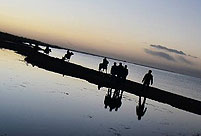The water crisis of India, a family dispute in Kazakhstan, and the inner struggle of a Mongolian teenager-- works of emerging Asian filmmakers invited to the 18th Busan International Film Festival (BIFF) in South Korea display a diverse Asia.
Twelve films from 11 countries invited to the New Currents, the event's main competition section, wrapped up their world or international premieres on Monday, half way through the festival' s ten days run.
"Those emerging directors who enter into the new currents section are new leaders of the Asian film industry, whose works cover different themes and reflected a diverse Asia," said Kim Ji- Seok, the executive programmer of BIFF in a press conference on Monday, who has attended the Busan international film festivals for 18 years.
As one of the most significant film festivals in Asia, the Busan Film Festival this year embraces a total of 299 films from 70 countries, showing a trend of growing Asian film industry in recent years.
Echoing the diverse film topic is a vibrant jury led by Iranian representative, female director Rakhshan Banietemad and her counterparts from Japan, South Korea, the U.S. and France.
"We are looking for some new voices from Asian cinema. The unknown filmmakers have rare chances to show their film and search for investors, now it is an important opportunity for them to display," said Banietemad.
The New Currents award will offer two prizes of 30,000 U.S. dollars to first or second-time Asian directors.
Unlike the three traditional international film festivals in Venice, Cannes and Berlin, Busan film festival is focusing more on discovering new talent rather than the established filmmakers, as well as finding and taping the Asian cinema potential.
What in common among this year's selection feature works in new currents is a reflection on the vanishing virtues of the community and an awareness of pressing social issues, according to the BIFF jury.
India is suffered with water shortage. Bakka, a famous dowser with special powers, is helping a team of European bird specialists build a well and pond to protect flamingos. The villagers believe that the search for water will benefit them as well, but reality is not so.
In his first feature film Jal" (Water Director Girish Malik seems to be telling the tale of Bakka, a lonely hero enduring hardships, but is in reality making a statement-- that man's jealousy, greed and bureaucracy is destroying the social order.
"We show the beautiful landscape of India's Great Rann of Kutch. People go there for sightseeing and come back with beautiful memories, but without caring about people living in there. We must draw people's attention on the water crisis and other hardship the villagers are going through there," said director Malik.
In Mongolia's capital Ulan Bator, with a remote TV control in his hand, teenager Tsog is trying to control the TV of a woman living in the opposite building, her life, the plane in the sky and even the whole world.
Mongolian director Byamba Sakhya's debut feature film "Remote control" made the first appearance of Mongolian films in Busan Film Festival's new currents section.
"Mongolia is just like the teenage boy of my film, he looks kind of a man eager for power, but still very young and naive," Sakhya told Xinhua in an exclusive interview, adding that he was aimed at reflecting the people's struggle in looking for new value and identities during the social transition.
In Tel Aviv, Israel, many Philippine laborers are experiencing a depressing life as a local law threatens to deport their children. This is what "Transit," the first feature of Philippine female director Hannah Espia, is about to tell.
"I want to show the struggle of migrant workers in terms of their identity and culture," said Espia. The immigrant children don't know what nationality they belong to, while the adults - Filipinos and Israelis alike harbor hostility against one another.
Meanwhile, those films displaying a tendency of bold experimentation like film in one-take and fluid viewpoints, according to the BIFF jury.
Kazakh director Alexey Gorlov's second feature is an experimental film executed in a single take. It makes sharp criticisms of the selfish nature of mankind through telling how a family treats their old mother Anna only for the sake of money.
The director shoots the entire film in one take, starting from Anna's arrival home, all the way to the very last scene during the 75 minutes of running time.
"By this way, I was trying to make the audience feel that they take part in the scene they are watching," said Gorlov made comments on his film "A story of an old woman."
In BIFF jury, Japanese director Aoyama Shinji's view, finding a new and specific way of telling story also matters.
"But the next step is to bring these excellent Asian films to the world. The BIFF will work as a network to make global movie industry discovers new Asia films, " said Shinji.
 2013 Colour Me Rad 5K run held in Canada
2013 Colour Me Rad 5K run held in Canada China's destroyer Qingdao sails out of Sydney Harbor
China's destroyer Qingdao sails out of Sydney Harbor Chinese tycoon aims to restore London's Crystal Palace
Chinese tycoon aims to restore London's Crystal Palace A staple of southern Chinese people
A staple of southern Chinese people Typhoon Fitow approaches China
Typhoon Fitow approaches China Tourists take pictures beside Qinghai Lake in Xining
Tourists take pictures beside Qinghai Lake in Xining New couples take wedding photos during holiday
New couples take wedding photos during holiday Serena Williams stumbles through to quarterfinals
Serena Williams stumbles through to quarterfinals Thailand Mobile Expo 2013 kicks off
Thailand Mobile Expo 2013 kicks off Photo collection of Chinese Navy
Photo collection of Chinese Navy Dense haze envelops N China
Dense haze envelops N China Twins Culture Festival kicks off in Beijing
Twins Culture Festival kicks off in Beijing UNESCO world heritage site: Montale Tower
UNESCO world heritage site: Montale Tower Egyptian protesters clash with police amid war anniv. celebration
Egyptian protesters clash with police amid war anniv. celebration Serena Williams wins second China Open title
Serena Williams wins second China Open titleDay|Week|Month